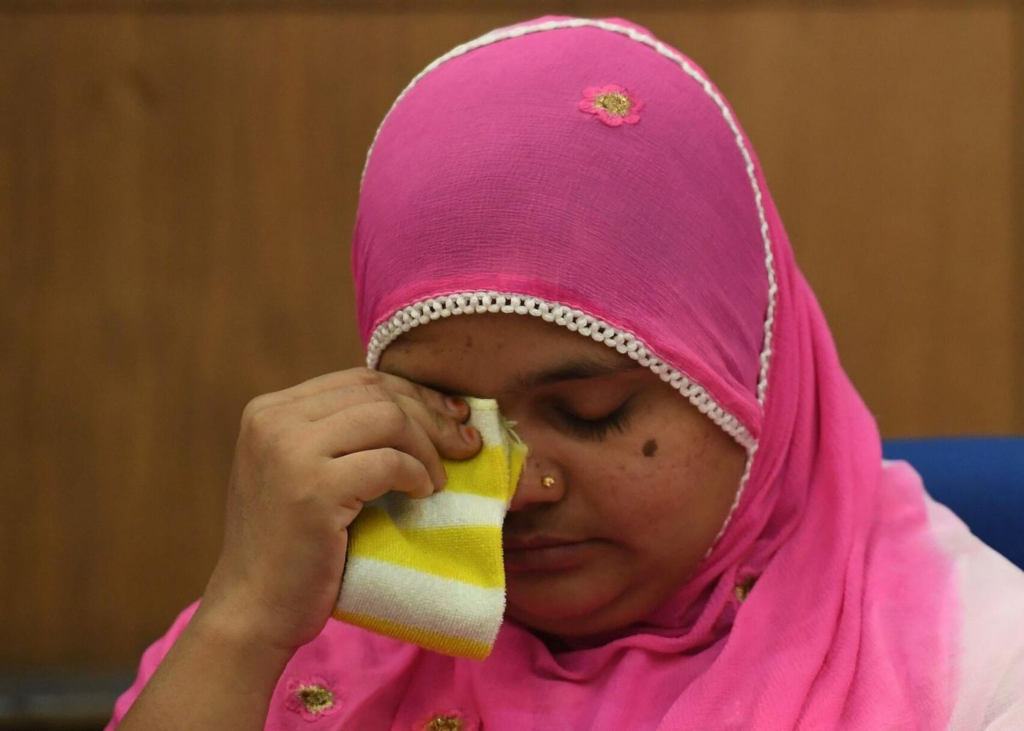Supreme Court Reverses Controversial Release: 11 Men
Supreme Court Reverses-Introduction:
Supreme Court Reverses-India’s Supreme Court delivered a landmark decision on Monday, overturning a contentious move by the Gujarat state government to release 11 men convicted of the heinous crimes of gang rape and murder during the 2002 Hindu-Muslim riots. The convicts, part of a Hindu mob, had been sentenced to life in prison for the brutal assault on Bilkis Bano, a pregnant Muslim woman. The release, which took place in August 2022, sparked widespread outrage and criticism, leading to protests across the country. The apex court’s ruling not only signifies a triumph for justice but also raises questions about the discretionary powers of state governments in such matters.

Supreme Court Reverses-Background:
Supreme Court Reverses-The crimes against Bilkis Bano unfolded in February 2002 during the intense Hindu-Muslim riots in Gujarat, one of India’s worst religious conflicts, resulting in over 1,000 deaths, mostly among the Muslim community. Bilkis Bano, then 21 years old and pregnant, faced unimaginable horrors as a Hindu mob attacked her family. Tragically, 14 of her family members, including her 3-year-old daughter, lost their lives. Bano’s testimony detailed a harrowing scene of violence, with men wielding swords, sticks, and sickles, perpetrating rape and murder.
Supreme Court Reverses-Legal Proceedings:
Supreme Court Reverses-After a high-profile trial in 2008, the perpetrators were sentenced to life imprisonment for rape and murder. However, in a controversial turn of events in August 2022, the Gujarat state government, led by Prime Minister Narendra Modi’s Bharatiya Janata Party (BJP), released the convicts prematurely. The decision was made under a provision in India’s Code of Criminal Procedure, allowing for the release of prisoners after serving 14 years.
Supreme Court Reverses-Supreme Court Intervention:
India’s Supreme Court, in a decisive move, overturned the state government’s decision, citing the lack of competence in passing remission orders by the Gujarat government. The court asserted that the trial and sentencing had occurred in Maharashtra state, questioning the authority of the Gujarat government to make such decisions. The justices strongly criticized the abuse of discretionary powers in releasing the convicts without proper authorization.
Supreme Court Reverses-Bilkis Bano’s Response:
Bilkis Bano, the survivor of the brutal assault, welcomed the Supreme Court’s ruling with profound relief. In a statement, she expressed gratitude to the thousands of people across the country who stood in solidarity with her. The decision, she said, felt like a weight had been lifted, allowing her to breathe again. Bano’s resilience and the support she received underscore the broader implications of the case for justice, especially in a country where incidents of rape are alarmingly frequent.
Supreme Court Reverses-Public Outcry and Protests:
The premature release of the convicts had triggered a wave of public outrage and protests, with supporters of Bano condemning it as an assault not only on the rights of Muslims but also on women’s rights in India. The country grapples with the grim reality that a woman is raped every 17 minutes, according to government data. The Supreme Court’s decision has been widely celebrated as a restoration of the rule of law, offering hope for justice and accountability.
Legal Analysis and Criticisms:
Legal experts and activists have lauded the Supreme Court’s judgment as a robust interpretation of the law, emphasizing the court’s directive for the immediate surrender of the accused. Aparna Bhat, an advocate involved in the case, commended the judges for their thorough examination of the law and the categorical order for the accused to return to custody. However, the case has also raised questions about the politicization, misogyny, and religious discrimination that may have influenced the initial decision to grant remission to the convicts.
Conclusion:
The Supreme Court’s intervention in the release of the 11 men convicted of gang rape and murder during the 2002 riots is a significant milestone in the pursuit of justice. The ruling not only rectifies a controversial decision but also highlights the need for transparency and adherence to legal procedures in cases of such gravity. Bilkis Bano’s resilience and the widespread support she received emphasize the collective call for justice and accountability, particularly in a nation where instances of violence against women persist. The judgment serves as a beacon of hope for survivors and advocates striving for a more just and equitable society.
